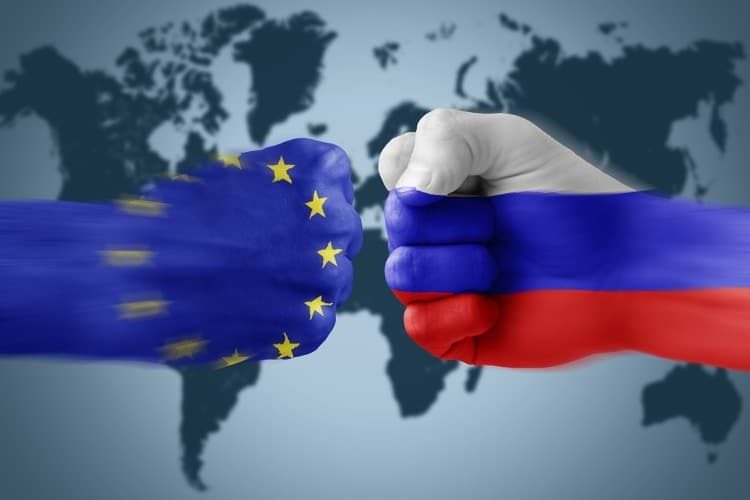
Russian Foreign Minister Sergey Lavrov on Friday accused western nations of waging a “total war on the Russian world” during a meeting with leadership from his country’s regions.
Lavrov maintained that Russia’s society and its political system allow the government to face this challenge successfully.
Western nations “are doubling, tripling, and quadrupling their efforts to deter our nation. They use a wide array of tools, from unilateral economic sanctions to totally deceitful propaganda in the global media,” Lavrov said, noting that “low-level Russophobia, which to our deepest regret is promoted by a number of governments, has risen to unprecedented levels.”
“The West has declared total war against us, against the entire Russian world. Nobody even hides this fact now,” Lavrov asserted.
He added that Russia responded to the pressure with a uniting of “all healthy patriotic forces” and an increase of public support for the country’s foreign policy.
Lavrov was speaking at a meeting of a Foreign Ministry council that includes all Russian regional heads as members. This body meets regularly to discuss how the diplomatic corps can assist the various areas of the country. As foreign minister, Lavrov is chair of the council.
As the war in Ukraine continues and the U.S. and European Union exert greater pressure on Russia, they have taken steps to end one of the last spheres of cooperation between Russia and the West — moving to suspend Russia’s access to crime-monitoring and data sharing.
“The European Union has unilaterally suspended expert contacts and data sharing with us” as part of the EMCDDA, Deputy Foreign Minister Oleg Syromolotov said in an interview with TASS. “The annual OSCE-wide Anti-Drug Conference has been postponed indefinitely,” he added.
“We believe this is a destructive approach. It plays into the hands of drug traffickers, who are taking advantage of the disagreements among countries to increase illicit drug supplies to Europe,” Syromolotov said.
Vasily Nebenzia, a representative of the Russian Federation to the United Nations, recently accused western countries of a “Russophobic information campaign” and of trying to build “a cyber totalitarianism” against his country — warning of the danger of a “cyber confrontation.”
“Once again, I call you to think of the danger of dragging the world into a cyber confrontation that is no less dangerous than [the] usage of WMDs,” Nebenzia said. He demanded that the West “demilitarize information space,” adding that Russia will respond to any cyberattacks.
The United States and other countries have condemned Russia for cyberattacks against Ukraine. Earlier this month, the United States and the European Union claimed Russia was responsible for an attack on Ukraine’s satellite network in February.
On Wednesday, the United States closed the last avenue for Russia to pay its billions in debt back to international investors. The Treasury Department refused to renew the license that allowed Russia to pay its debt holders through American banks. This will likely result in Russia defaulting on its sovereign debt.
The White House is considering sending advanced, long-range weapons to Ukraine. This comes after Congress passed and Joe Biden signed a $40 billion aid package for Ukraine.
Currently, the European allies are working to approve an additional $527 million in military aid to Ukraine, which would bring the bloc’s assistance to $2.1 billion since the conflict began.
As for the humanitarian assistance, the European Union (EU) doled out €243 million ($256.65 million) to help civilians affected by the war in Ukraine. This includes €230 million ($242.42 million) for Ukraine and €13 million ($13.73 million) for Moldova to aid people fleeing the aggression. “This EU humanitarian aid provides food, water, healthcare, shelter and helps cover people’s basic needs,” per the EU.
Despite the unity of the western powers against Russia, the Russian ruble is the best-performing currency in the world this year.
As CBS News reports:
Two months after the ruble’s value fell to less than a U.S. penny amid the swiftest, toughest economic sanctions in modern history, Russia’s currency has mounted a stunning turnaround. The ruble has jumped 40% against the dollar since January.
“It’s an unusual situation,” said Jeffrey Frankel, professor of capital formation and growth at the Harvard Kennedy School.
Normally, a country facing international sanctions and a major military conflict would see investors fleeing and a steady outflow of capital, causing its currency to drop. But Russia’s unusually aggressive measures to keep money from leaving the country, in combination with the forcefulness of Western sanctions, are working to create demand for rubles and pushing up its value.
The resilience of the ruble means Russia, for the moment, has a layer of insulation shielding it from the punitive policies imposed by the West.




